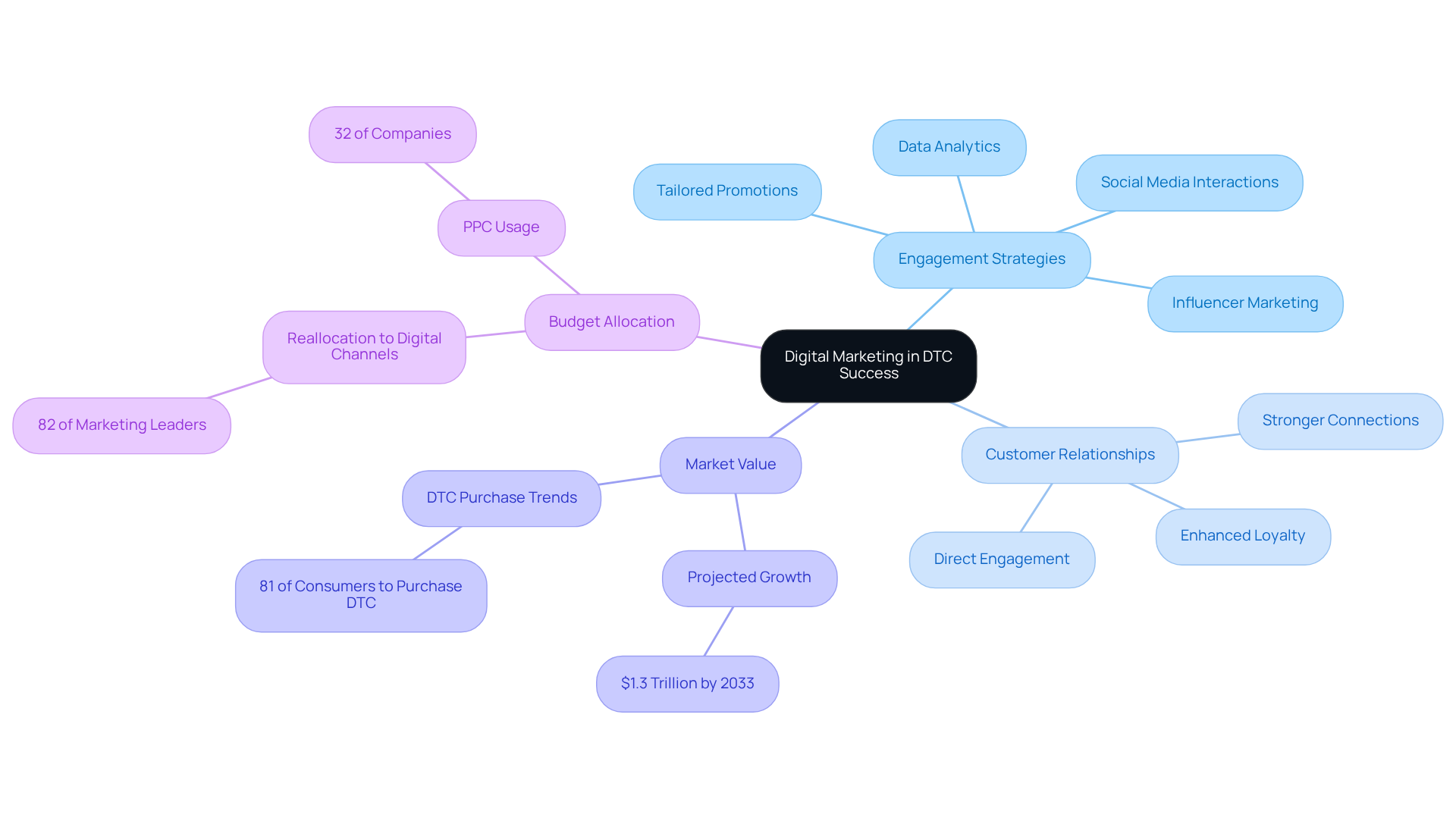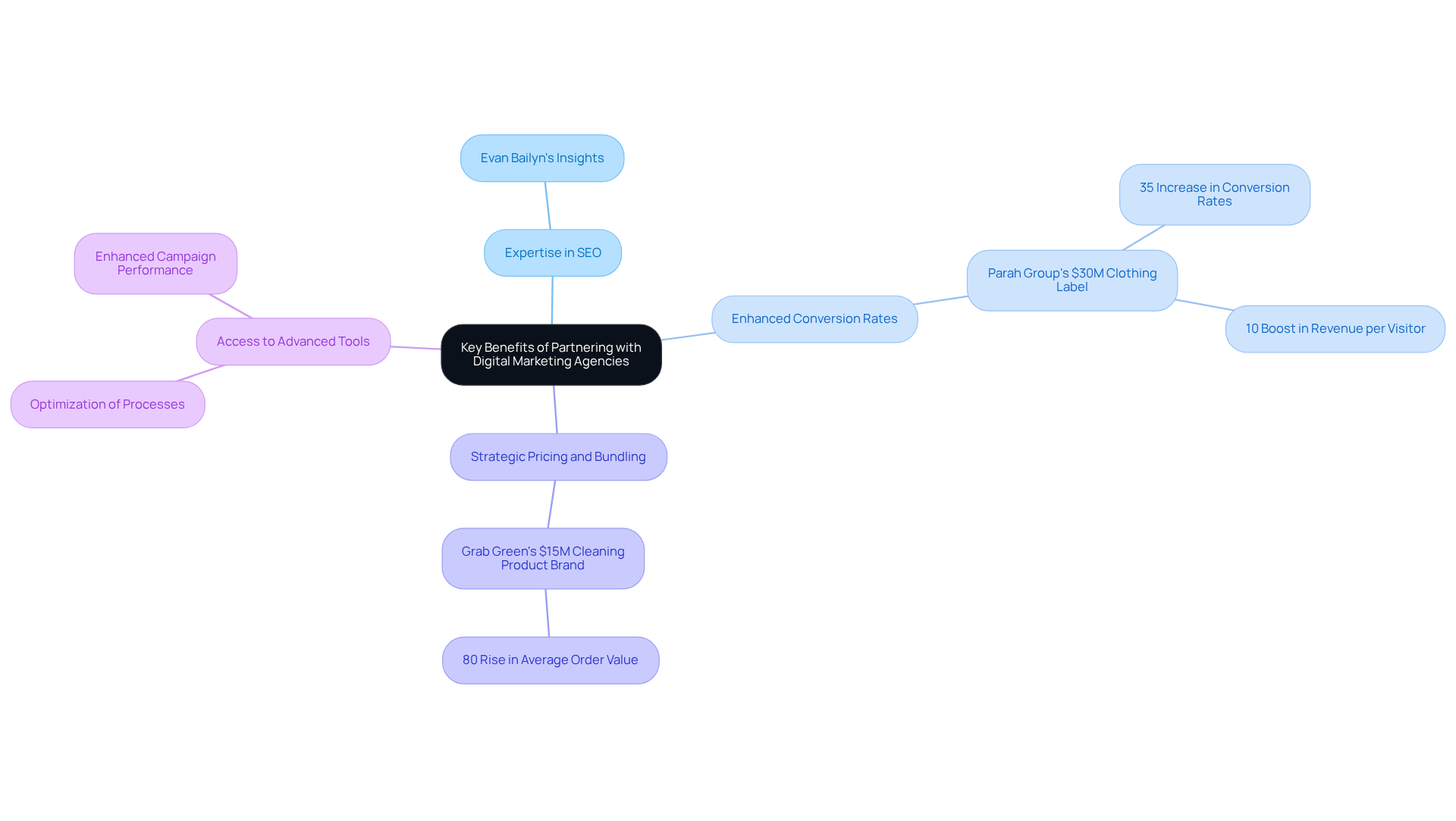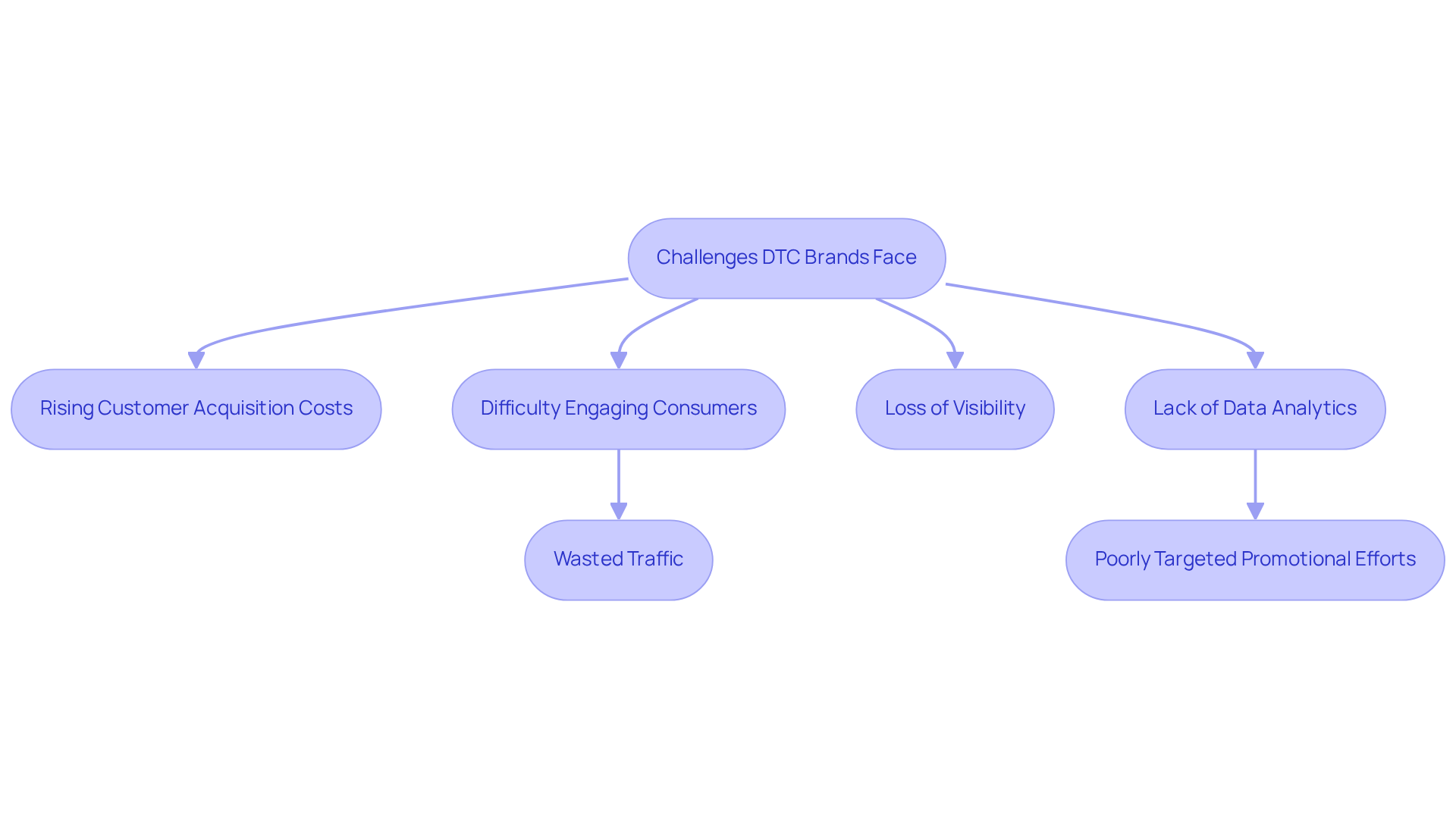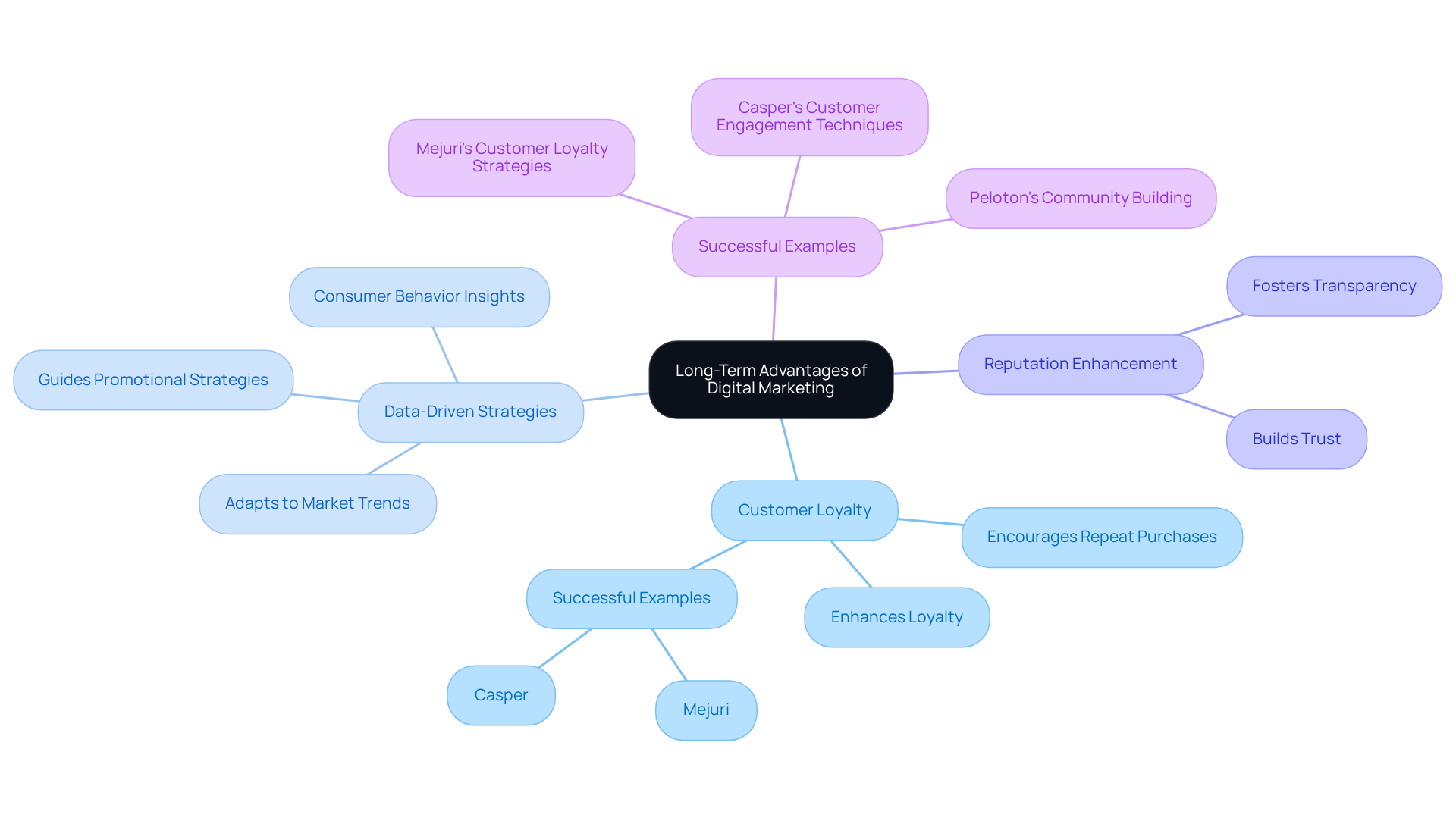
Overview
Digital marketing and advertising companies are indispensable for DTC brands, facilitating direct consumer engagement, optimizing promotional strategies, and enhancing customer loyalty, which ultimately drives sales growth. This article illustrates how these companies leverage data analytics and targeted advertising to tackle challenges such as rising customer acquisition costs. Furthermore, it provides compelling case studies that showcase significant improvements in conversion rates and overall profitability for DTC brands, reinforcing the critical role these strategies play in achieving business success.
Introduction
Digital marketing has emerged as a vital force behind the success of Direct-to-Consumer (DTC) brands, fundamentally reshaping their connection with consumers in an increasingly digital world. By harnessing the power of targeted advertising, social media engagement, and data-driven strategies, DTC companies cultivate deeper relationships with their audiences, enhancing loyalty and driving sales. However, as the competitive landscape intensifies and customer acquisition costs rise, the pressing question remains: how can DTC brands effectively leverage digital marketing to not only survive but thrive in this dynamic environment?
The Critical Role of Digital Marketing in DTC Brand Success
Digital marketing and advertising companies serve as the cornerstone of success for Direct-to-Consumer (DTC) companies, empowering them to engage directly with consumers in ways that traditional retail models cannot. By leveraging digital platforms, DTC companies can forge connections with their audiences through tailored promotions, social media interactions, and targeted advertising provided by digital marketing and advertising companies. This direct engagement cultivates stronger relationships, enhances customer loyalty, and ultimately drives sales.
For instance, companies that harness data analytics to understand consumer behavior can refine their promotional strategies to meet specific needs, resulting in heightened conversion rates. Moreover, online promotion allows DTC companies to maintain control over their communication and customer experience, a critical advantage for digital marketing and advertising companies in a competitive landscape characterized by rapidly evolving consumer preferences.
With the projected to reach approximately $1.3 trillion by 2033, DTC companies that prioritize strategies offered by digital marketing and advertising companies are strategically positioned for success in the coming years. Furthermore, as 82% of promotional leaders are reallocating budgets towards online platforms, the importance of precise targeting and innovative strategies cannot be overstated. Successful DTC companies are increasingly embracing influencer marketing and optimizing landing pages, much like digital marketing and advertising companies do, to enhance consumer engagement and drive sales.

Key Benefits of Partnering with Digital Marketing Agencies for DTC Brands
Collaborating with digital marketing and advertising companies offers DTC companies a wealth of advantages that can significantly enhance their promotional efforts. These digital marketing and advertising companies bring specialized expertise in areas such as SEO, content marketing, and social media management, enabling companies to leverage advanced strategies that may not be available internally.
For example, Parah Group has effectively transformed the profitability of numerous DTC companies through innovative conversion rate optimization (CRO) strategies. A notable instance involved a $30M clothing label that faced challenges with low conversion rates; following a comprehensive redesign of their homepage and the integration of gamified elements, they achieved a remarkable 35% increase in conversion rates and a 10% boost in revenue per visitor.
In a similar vein, Grab Green, a $15M cleaning product brand, experienced an 80% rise in average order value (AOV) by implementing strategic pricing and bundling options. These case studies illustrate how digital marketing and advertising companies conduct thorough , providing insights that inform more effective promotional campaigns.
Moreover, agencies often have access to advanced tools and technologies that can optimize processes and enhance campaign performance. By utilizing these resources, DTC companies can achieve greater ROI on their promotional investments, ultimately leading to increased sales and enhanced customer loyalty.

Challenges DTC Brands Face Without Effective Digital Marketing
DTC companies that neglect the services of digital marketing and advertising companies face significant challenges that can impede their growth and profitability. A critical issue is the rising cost of customer acquisition, which has increased by 25% to 40% across various channels. Brands that fail to engage consumers through targeted strategies from digital marketing and advertising companies often find it difficult to convert website visitors into paying customers, resulting in wasted traffic and resources. Without a , digital marketing and advertising companies risk losing visibility in an increasingly saturated marketplace, which can lead to diminished awareness and customer loyalty.
Furthermore, brands that do not harness data analytics forgo vital insights into consumer behavior. This oversight can result in poorly targeted promotional efforts that fail to resonate with their audience, exacerbating the difficulties of customer acquisition. For instance, businesses like ButcherBox have highlighted the challenges of attracting new clients amid rising costs and declining engagement, underscoring the necessity of a strategic online approach. As the DTC landscape evolves, companies must prioritize online promotion, especially those in digital marketing and advertising companies, to effectively address these challenges and sustain their growth.

Long-Term Advantages of Digital Marketing for Sustainable Growth
Investing in digital promotion provides DTC companies with essential long-term benefits that foster sustainable growth, similar to the advantages gained by digital marketing and advertising companies. A robust online presence cultivates enduring relationships with customers, significantly enhancing loyalty and encouraging repeat purchases. Notably, 61% of consumers indicate that specific labels offer a more tailored experience, a crucial factor for retention. Digital marketing and advertising companies empower organizations to gather and analyze consumer data, which guides future promotional strategies and product development. This allows companies to swiftly adapt to evolving consumer preferences and market trends, ensuring competitiveness in a dynamic environment.
Moreover, effective strategies implemented by digital marketing and advertising companies enhance reputation and foster trust, as consumers increasingly prioritize transparency and authenticity. Successful DTC companies like Mejuri and Casper exemplify how strategic marketing efforts can nurture customer loyalty and generate positive word-of-mouth referrals. By leveraging these insights, DTC brands can position themselves for continued success in an ever-evolving marketplace, ultimately solidifying their growth trajectory.

Conclusion
Digital marketing and advertising companies are essential to the success of Direct-to-Consumer (DTC) brands, facilitating connections with consumers that traditional retail cannot achieve. By leveraging digital platforms, these companies significantly enhance customer engagement and loyalty, ultimately driving sales and fostering sustainable growth in an increasingly competitive landscape.
The article underscores several critical arguments, including:
- The pivotal role of data analytics in refining promotional strategies
- The benefits of collaborating with specialized agencies
- The challenges faced by DTC brands without effective digital marketing
Case studies exemplify how strategic partnerships can lead to substantial improvements in conversion rates and customer acquisition, highlighting the necessity of targeted online strategies in today’s market.
As the digital landscape evolves, DTC brands must prioritize digital marketing to maintain competitiveness and relevance. Embracing innovative strategies and leveraging expert insights not only addresses immediate challenges but also sets the foundation for long-term success. By investing in digital marketing, DTC companies can cultivate enduring relationships with consumers, adapt to shifting preferences, and secure their market position for years to come.
Frequently Asked Questions
What is the role of digital marketing in the success of DTC brands?
Digital marketing is crucial for Direct-to-Consumer (DTC) brands as it enables them to engage directly with consumers through tailored promotions, social media interactions, and targeted advertising, fostering stronger relationships and enhancing customer loyalty.
How do DTC companies utilize data analytics in their marketing strategies?
DTC companies use data analytics to understand consumer behavior, allowing them to refine their promotional strategies to meet specific needs, which results in increased conversion rates.
What advantages do DTC companies gain from online promotion?
Online promotion allows DTC companies to maintain control over their communication and customer experience, which is vital in a competitive landscape with rapidly changing consumer preferences.
What is the projected market value of online promotion by 2033?
The global market value of online promotion is projected to reach approximately $1.3 trillion by 2033.
How are promotional leaders adjusting their budgets in response to digital marketing trends?
Approximately 82% of promotional leaders are reallocating their budgets towards online platforms, highlighting the growing importance of digital marketing strategies.
What strategies are successful DTC companies adopting to enhance consumer engagement?
Successful DTC companies are increasingly adopting influencer marketing and optimizing landing pages to enhance consumer engagement and drive sales, similar to the practices of digital marketing and advertising companies.
FAQs











